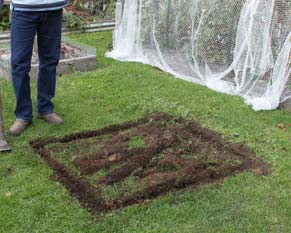vegetable patch design
building a raised bed
building a raised bed - Page 1
This section looks at how to build a
wooden raised bed on a lawn.
Note that the photos on this page were taken for demonstration purposes
only. A raised bed would normally be longer than the one
photographed and made out of thicker timber.1. Choose where to place your
bed
Chose a site for your bed as per the
Siting A Raised Bed
webpage. 2. Build your raised bed frame
These instructions are based on the use of a wooden raised bed frame,
but any number of materials can be used. For more
information about different materials that can be used to build a raised
bed Frame see the
Raised Bed
Materials webpage. It is my experience that it's best to make the frame then move it into place rather than making it exactly where you want the bed to go. However this may not be practicable if you are building very long raised beds.


- Place raised bed where you want it to go. Then with a spade
cut along the outside edges to a depth of around 6 to 10
centimetres.
Note that this cut should penetrate to below the root structure of the grass.
- Repeat the exercise on the inside.
4. Dig out the cut section


- Remove the raised bed frame.
- With a mattock or hoe dig out the cut section to the depth
of the spade cut, This should be around 6
to 10 centimetres. At the very least it should be to a
depth below the root structure of the grass.
- Place the dug out clods with the grass top facing down in
the raised bed area.
If the lawn has Couch grass in it than I recommend that you peel up the entire grass section inside the bed, flipping the clods upside down just as for the cut section.


5. Replace Frame and check
level


- Place the frame back in the trench.
- Check to see that the
top of the frame is reasonably level.
- If the width of the frame is
not level then remove it and deepen the trench on the
up side.
Do not make the down side shallower as this will give an entry point for weeds such as couch to get in. If the length of the raised bed goes down a fairly steep slope then you should consider building the raised bed in a series of stepped terraces .
The aim is to have the bed reasonably level, especially at it's width, and the frame dug in deep enough to create a barrier against penetrating weeds such as Couch.

